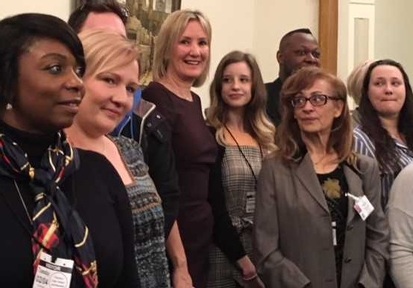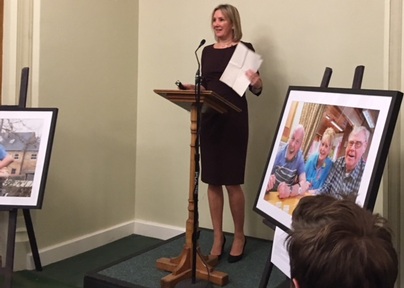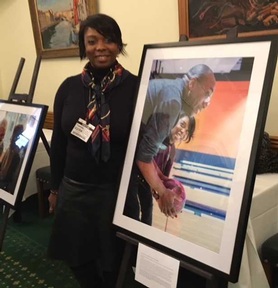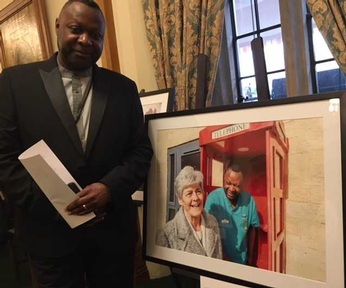Care minister says care workers, unlike politicians, can 'be proud of the work they do'
Care Minister Caroline Dinenage has told care workers that unlike politicians “when you go home at the end of the day you can be proud about the work you do” and informed carehome.co.uk that she is “hopeful” the social care green paper will arrive this summer.

No 'monotonous day-to-day existence'
The minister rejected the idea that nobody wants to work in care in a speech launching a photography exhibition of care workers at the Houses of Parliament on Tuesday.
Portraits of care workers and the people they support, which include those with learning disabilities, physical disabilities and dementia, were commissioned by the Department of Health and Social Care.
The exhibition is aimed at boosting the number of people applying to work in the care sector as part of the government's care recruitment campaign #everydayisdifferent.
Addressing a roomful of care workers, Ms Dinenage said: “A couple of times, I’ve spoken to journalists who say ‘nobody wants to work in care’. These pictures tell a different story.”
The portraits of care workers enjoying activities with the people they care for, she said, were examples of great care, adding “we shouldn’t be keeping people in a monotonous day-to-day existence”.
Describing care staff as 'unskilled. That just blows my mind'
Care work she said is “sometimes described as a job that is unskilled.That just blows my mind.
“As a society we have to be grateful for the work you do. When you go home at the end of the day you can be proud about the work you do. Not sure, as politicians, we can really say the same ourselves.
“You just need to look around this room to see no two pictures are the same, no two days are the same, no two jobs are the same."
There are 1.47m people working in the adult social care sector but there are still 110,000 vacancies across England at any one time.
The care sector has the highest staff turnover rate of any sector in the UK. Some in the sector have criticised the government’s campaign as unrealistic arguing more funding is needed to ensure care staff have decent pay, conditions, career progression and recognition.
The recruitment campaign began last February and is scheduled to end in April. The campaign is targeted at 20-39-year-olds, as the government says research indicates this age group is most likely to consider a job in social care in the next year.

Green paper arriving this summer 'hopefully'
In an exclusive interview with carehome.co.uk, Caroline Dinenage said at the launch of the exhibition: “I think we need to make sure opportunities are there for professional development, career progression, for promotion with a range of things like nursing associates and nursing apprentices where people can learn on the job."
Care workers can now upskill to become nursing associates. A nursing associate is a new role designed to address the skills gap between health and care assistants and registered nurses.
The Nursing & Midwifery Council refer to it as a role that will also provide a progression route into graduate level nursing, enabling registered nurses to focus on more complex clinical duties.
The minister also welcomed “counselling and other things that we can pursue so that care workers feel that they get the support to do their jobs.
“After the campaign, we will measure it and look at it very carefully. It is a very targeted campaign. We will see what works.”
When asked when the social care green paper will come out, she replied: “As soon as possible. I can’t wait. I literally can’t wait."
To the question of whether it would be published this year, she said: “Oh yes”. Could the sector expect it this summer? She replied “Hopefully”.
Ms Dinenage added: “Care work can be physically and emotionally challenging but if you have the right values it can also be hugely rewarding - 96 per cent say their work makes a difference to people’s lives. I think these photos really represent that.”

'I fell in love with it'
Captured in a portrait is care home owner Sonia Parnell. She trained as a hairdresser but her life changed when she was invited into a care home to cut residents' hair. She said: “I fell in love with it.”
Some 21 years ago, Ms Parnell opened her own care home Liberty House Care Homes Ltd in Birmingham, which cares for people with moderate to severe learning disabilities.
Sonia Parnell said: “I really enjoy what I do. My six grandchildren all get involved”.
Ms Parnell said: “We give people experience of getting into care. Schools and colleges visit the home. My brother trained at the home and he is now a mental health nurse”.
But she added: “We need more funding for the care sector. Care workers want to feel as valuable as nurses. They need recognition, good wages not national minimum wage.”
Attendees at the exhibition included Vic Rayner, executive director of the National Care Forum. She welcomed the government’s recruitment campaign and said: “Anything that highlights the great work of the care workforce and encourages more recruitment into the sector is a great thing.
“Obviously, there are ongoing issues, things we are waiting for, the need for a green paper etc, more funding etc but the campaign is to be welcomed.”
Accountant who changed career

Care home manager Gez Ossai, whose portrait is also seen in the exhibition, runs a 62-bed care home in Cheltenham offering dementia nursing care at Wentworth Court.
Gez Ossai said: "Before I went into care, I was an accountant. I witnessed first-hand the excellent care my wife received when she had terminal cancer and I realised I would love to do something like that and I thought I'd be good at it." He said: “We’ve never paid anybody minimum wage. It is upsetting that there is a divide between care home care assistants and a health care assistant in a hospital who gets paid more.
"All my senior carers started work as carers. There is career progression at my home. We do promote from within and look outside the home to get fresh ideas.
"We work with schools; even five and six-year-olds visit the home because they are the future carers, nurses and care home managers.”
Latest News
 29-Jul-24
Dementia Bus gives carehome.co.uk staff insight into life with dementia
29-Jul-24
Dementia Bus gives carehome.co.uk staff insight into life with dementia
 01-Mar-24
Find out the top care homes in 2024
01-Mar-24
Find out the top care homes in 2024
 21-Mar-23
UK's top care homes in 2023 revealed
21-Mar-23
UK's top care homes in 2023 revealed
 03-Jan-23
carehome.co.uk launches free care helpline
03-Jan-23
carehome.co.uk launches free care helpline
 13-Dec-22
5 mins with Emily Whitehurst, chief operating officer for Constantia Healthcare
13-Dec-22
5 mins with Emily Whitehurst, chief operating officer for Constantia Healthcare